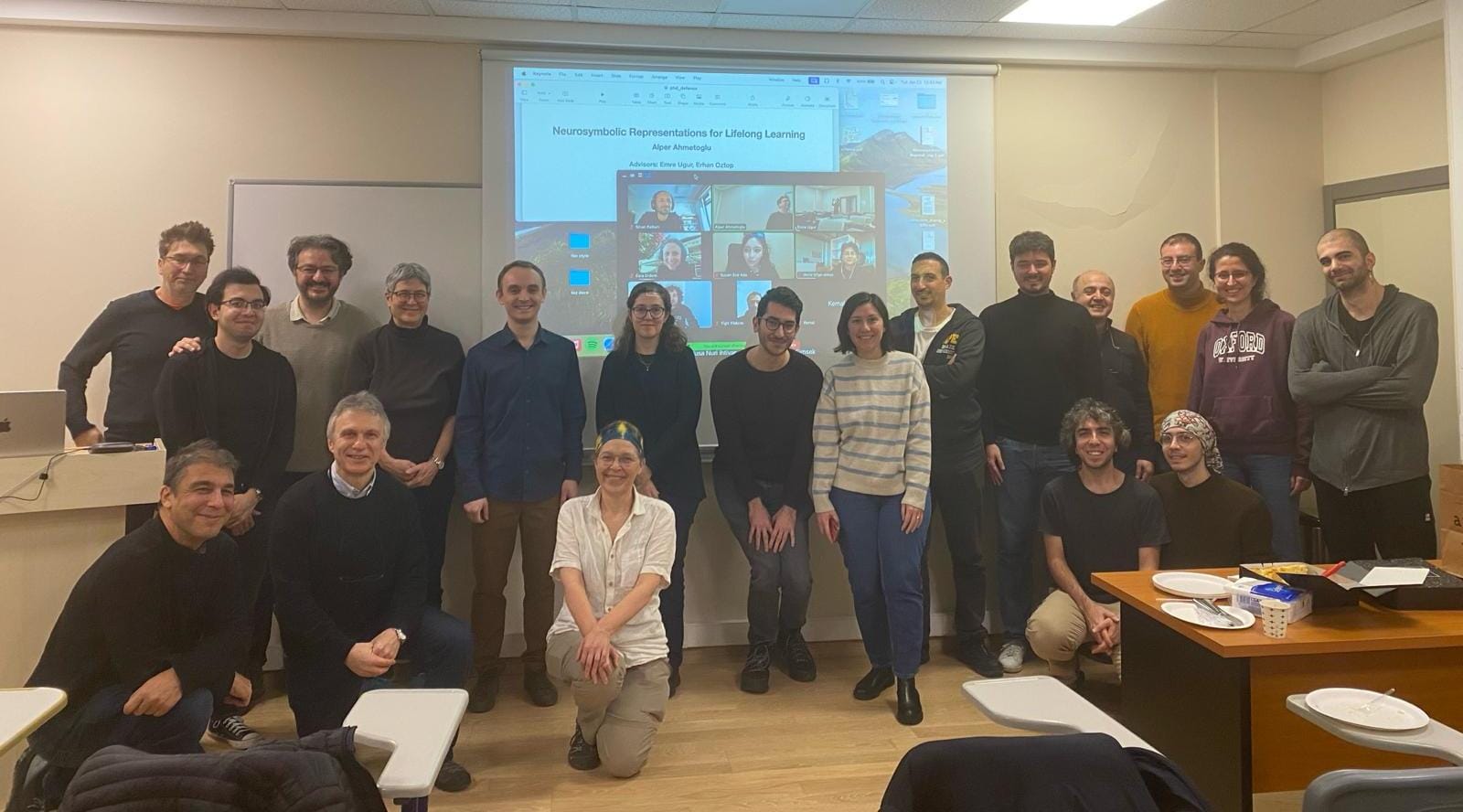Title: Neurosymbolic Representations for Lifelong Learning
Abstract:
This thesis presents a novel framework for robot learning that combines the advantages of deep neural architectures in processing high-dimensional vectors with classical AI search techniques to bridge the gap between continuous sensorimotor data of the robot and domains consisting of finite entities. The aim is to convert information about the environment collected through interactions into an appropriate symbolic form on which a search tree can be built to reach a desired state. The framework consists of an encoder-decoder type of network with binarized activations in the bottleneck layer. The state of the environment, represented as a set of object features, is given to the encoder as input. The output is a discrete vector, treated as the object’s symbol, given to the decoder together with the action vector. The decoder predicts the effect observed by the agent due to the executed action. Once the network is trained, we can transform the continuously represented environment definition into symbolic vectors using the encoder. This allows us to build rules defining the transitions in the environment defined over these symbols. These rules can be translated into planning domain definition language (PDDL), allowing domain-independent off-the-shelf planners to be used to search for a goal state. Our experiments on tabletop object manipulation setups show that the system can learn appropriate symbols of the environment that allow it to build object towers with desired heights and complex object structures that require modeling the relations between objects by reasoning through the rules defined over the symbols learned in an unsupervised manner. As the framework is built with differentiable blocks, it affords appending recent advances in deep learning with ease, allowing it to be extensible in multiple directions.
Advisor: Assoc. Prof. Emre Ugur
Co-Advisor: Prof. Erhan Oztop
Journals:
1. Ahmetoglu, A., Ugur, E., Asada, M., & Oztop, E. (2022). High-level features for resource economy and fast learning in skill transfer. Advanced Robotics, 36(5-6), 291-303.
2. Ahmetoglu, A., Seker, M. Y., Piater, J., Oztop, E., & Ugur, E. (2022). Deepsym: Deep symbol generation and rule learning for planning from unsupervised robot interaction. Journal of Artificial Intelligence Research, 75, 709-745.
3. Ahmetoglu, A., Celik, B., Oztop, E., & Ugur, E. (2024). Discovering Predictive Relational Object Symbols with Symbolic Attentive Layers. IEEE Robotics and Automation Letters.
Conferences:
1. Ahmetoglu, A., Öztop, E., & Uğur, E. (2023, July). Deep multi-object symbol learning with self-attention based predictors. In 2023 31st Signal Processing and Communications Applications Conference (SIU) (pp. 1-4). IEEE. (IEEE Best Student Paper Award)
2. Ahmetoglu, A., Oztop, E., & Ugur, E. (2024). Symbolic Manipulation Planning with Discovered Object and Relational Predicates. arXiv preprint arXiv:2401.01123. (submitted to ICRA 2024)
3. Celik, B., Ahmetoglu, A., Ugur, E., & Oztop, E. (2023, November). Developmental Scaffolding with Large Language Models. In 2023 IEEE International Conference on Development and Learning (ICDL) (pp. 396-402). IEEE.
1. Ahmetoglu, A., Ugur, E., Asada, M., & Oztop, E. (2022). High-level features for resource economy and fast learning in skill transfer. Advanced Robotics, 36(5-6), 291-303.
2. Ahmetoglu, A., Seker, M. Y., Piater, J., Oztop, E., & Ugur, E. (2022). Deepsym: Deep symbol generation and rule learning for planning from unsupervised robot interaction. Journal of Artificial Intelligence Research, 75, 709-745.
3. Ahmetoglu, A., Celik, B., Oztop, E., & Ugur, E. (2024). Discovering Predictive Relational Object Symbols with Symbolic Attentive Layers. IEEE Robotics and Automation Letters.
Conferences:
1. Ahmetoglu, A., Öztop, E., & Uğur, E. (2023, July). Deep multi-object symbol learning with self-attention based predictors. In 2023 31st Signal Processing and Communications Applications Conference (SIU) (pp. 1-4). IEEE. (IEEE Best Student Paper Award)
2. Ahmetoglu, A., Oztop, E., & Ugur, E. (2024). Symbolic Manipulation Planning with Discovered Object and Relational Predicates. arXiv preprint arXiv:2401.01123. (submitted to ICRA 2024)
3. Celik, B., Ahmetoglu, A., Ugur, E., & Oztop, E. (2023, November). Developmental Scaffolding with Large Language Models. In 2023 IEEE International Conference on Development and Learning (ICDL) (pp. 396-402). IEEE.
Organized Workshops:
1. RSS 2021 Workshop on Declarative and Neurosymbolic Representations in Robot Learning and Control (https://dnr-rob.github.io, online)
2. IROS 2022 Workshop on Lifelong Learning of High-level Cognitive and Reasoning Skills (https://lifelongrobotics.github.io , Kyoto, Japan)
2. IROS 2022 Workshop on Lifelong Learning of High-level Cognitive and Reasoning Skills (https://lifelongrobotics.

